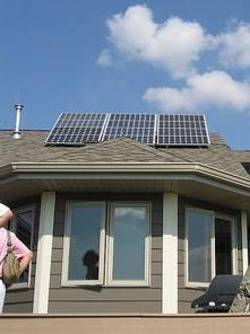Solar residential rooftops are a pretty hot topic right now.
If you’re lucky enough to live in an area that provides rebates on solar panels for homes, ‘going solar’ might just be a great idea financially.
Even if there are no government incentives available in your area, a home solar system could still be a good environmental choice (although the financial payback may not be too hot).
A simplified look at the solar home debate would state that people are only interested in solar panels for one of those two reasons: Financial or environmental.
Of course, things are never as simple as they seem.
The vast majority of people I speak with have a foot in both camps: They want to make their home and lifestyle as sustainable as possible, but they also don’t have unlimited amounts of money to spend on their environmental efforts.
Therefore, solar residential has to make sense environmentally and financially.
To find out if a solar house makes sense for you, let’s take a look at each of these criteria individually:
Do Solar Panels Make Environmental Sense?
There are a lot of ways to look at the environmental side of home solar energy.
First, we’ll address the solar power myth that it takes more energy to produce a solar panel than the solar panel will produce over its lifetime.

Independent studies actually put the ‘energy payback time’ of crystalline solar panels at anywhere from 1.5 to 4 years.
This means that a solar panel produces the amount of energy used to build it in a few years. Since a solar panel is usually warrantied for 25 years, it will produce many times it’s ’embodied energy’ over its lifetime.
So we’ve established that solar panels are effective energy producers, but how do they compare with traditional energy sources?
Although the earth receives more than enough solar energy to meet humanity’s power needs, we are not quite ready to switch to an all-solar energy plan just yet.
If we look at solar residential as a supplemental power source for the time being, what benefits can it provide?
Well, here are a few:
- Reduce our dependence on fossil fuels and nuclear
- Ease the strain on overloaded power grids
- Put otherwise unused rooftops to work
- Make people more aware of their energy consumption
The bottom line on the environmental side of solar panels comes down to this:
Even if you don’t think solar power can save the world, a solar power system is still a great way to tread more lightly on the earth.
Perhaps more importantly, going solar will also help you to be more aware of the amount of power your home consumes (and as the business gurus say: ‘What gets measured gets managed”).
Do Solar Panels Make Financial Sense?
Here’s the unequivocal answer as to whether solar panels make financial sense: It depends.
If you’ve been doing your solar power homework you probably saw that answer coming from a mile away. You already knew that the financial viability of solar power largely depends on where you live.
Why is this?
Because the availability of rebates and incentives varies widely depending on which state, province, and country you reside in.
If you’re lucky you may be eligible for municipal, state, federal, and utility incentives. If you’re not-so-lucky you may not be eligible for any of these solar grants and rebates.
(U.S. residents can find out more by checking out the DSIRE website.)
On top of the discrepancy in solar incentives, we also have to consider which solar financing options are available.
If you can take advantage of a zero-down solar lease or power purchase agreement, you might be able to start saving money with your solar panels from day one.
So do solar electric panels make financial sense? Definitely maybe.
What we find when we look at the environmental and financial viability of solar residential is that solar panels are a great idea…if they won’t break the bank.
That’s right, solar panels are a great way to make a difference environmentally, if you can make them work financially.
